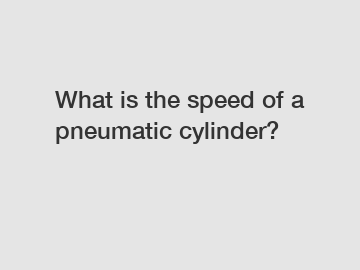Feb. 12, 2024
Hardware
DRAKE contains other products and information you need, so please check it out.
What is the Speed of a Pneumatic Cylinder?
When it comes to understanding the speed of a pneumatic cylinder, there are several factors to consider. Pneumatic cylinders are devices that use compressed air to create linear motion, making them crucial components in many industrial applications. The speed of a pneumatic cylinder plays a vital role in determining its overall efficiency and effectiveness. In this article, we will explore the various factors that affect the speed of a pneumatic cylinder and how it can be controlled and optimized for maximum performance.

Factors Affecting the Speed of a Pneumatic Cylinder.
1. The Inlet Air Pressure:
One of the primary factors affecting the speed of a pneumatic cylinder is the inlet air pressure. The higher the pressure, the faster the cylinder will move. Different applications may require different speeds, and adjusting the inlet air pressure can help achieve the desired level of speed. However, it is important to note that increasing the air pressure too much can lead to excessive wear and damage to the cylinder seals and other components.
2. Cylinder Bore Size:
The bore size of a pneumatic cylinder also impacts its speed. Larger bore sizes can generate more force, but they may sacrifice speed. Conversely, smaller bore sizes can provide higher speeds but with less force. It is essential to select the appropriate bore size for the specific application, considering both the required speed and the necessary force.
3. Load and Resistance:
The load being moved by the pneumatic cylinder and any external resistance also affect its speed. Heavier loads or increased resistance will slow down the cylinder's movement. It is crucial to consider the load and resistance in the design and selection of the cylinder to ensure that it can operate effectively at the desired speed.
Controlling and Optimizing the Speed of a Pneumatic Cylinder.
1. Flow Control Valves:
Flow control valves are commonly used to regulate the speed of a pneumatic cylinder. These valves adjust the volume of air entering or exiting the cylinder, allowing for precise control over its speed. By restricting or increasing the airflow, the speed of the cylinder can be adjusted to match the specific requirements of the application.
2. Pressure Regulators:
Pressure regulators are another valuable tool for controlling the speed of a pneumatic cylinder. These devices maintain a consistent and desired air pressure level, ensuring consistent and predictable cylinder speed. By adjusting the pressure regulator, the speed can be finely tuned for optimal performance.
3. Consideration of Stroke Length:
The stroke length, which refers to the distance the piston travels, is another factor to consider when optimizing the speed of a pneumatic cylinder. A shorter stroke length allows for faster cycles, while a longer stroke length allows for slower, more powerful movements. Understanding the requirements of the application and selecting an appropriate stroke length can help optimize speed and efficiency.
In conclusion, the speed of a pneumatic cylinder is influenced by various factors such as inlet air pressure, cylinder bore size, load, and resistance. By carefully considering these factors and utilizing tools such as flow control valves, pressure regulators, and stroke length adjustments, the speed of a pneumatic cylinder can be controlled and optimized for specific industrial applications. It is crucial to select the right combination of components to achieve the desired speed and ensure efficient operation. For further assistance or inquiries, please do not hesitate to contact us.
(Contact us for further assistance or inquiries.).
For more information, please visit our website.
Are you interested in learning more about Customized Power Chuck? Contact us today to secure an expert consultation!
Previous: Which grill is best for balcony?
Next: Which Benefits Drive the Growing Popularity of Low Volume Production Machining?
If you are interested in sending in a Guest Blogger Submission,welcome to write for us!
All Comments ( 0 )